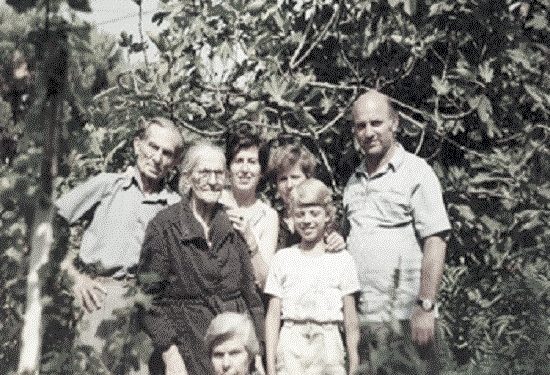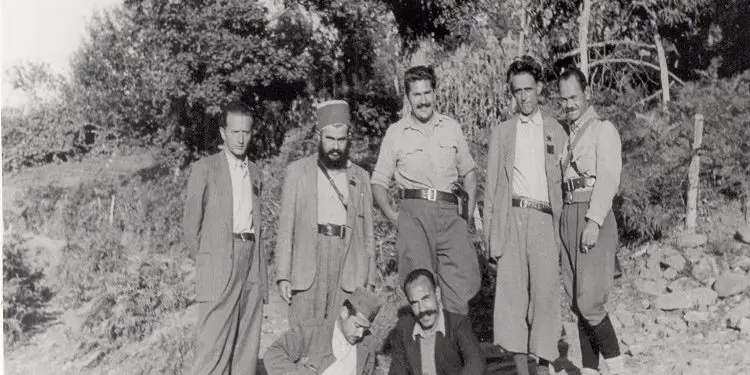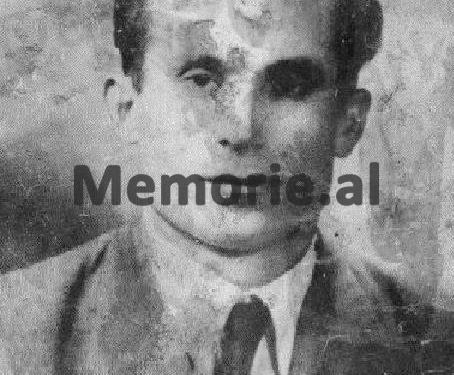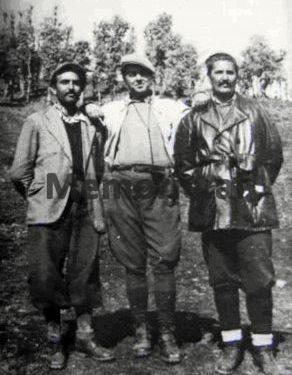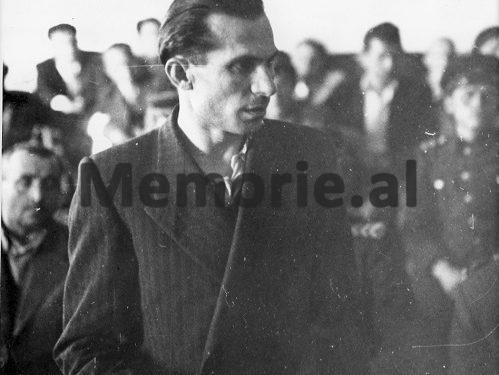By Gjergj Titani
The twelfth part
Memorie.al / In the first part of this interview, published in the previous issue, Assembly, the only daughter of Pandi Kristos, told about her early youth full of contempt and insults from her friends and the disgust of the leaders of the Committee of the Union of the Labor Youth of Albania in the capital. The meetings with her father in prison and the deportation of her family from Tirana to Lushnja. The gloomy life of the family of the former close friend of Enver Hoxha and the hard work they did during the exile, in the Agricultural Farm of Çerma. The monstrous behavior of the powerful State Security and others. How Enver sent a letter to Nexhmije Hoxha, to continue his higher studies and the reactions after this letter, which added even more to the family’s misfortunes. And in the second part published in the previous issue, Mrs. Assembly Kristo Vullkani, with her interview, introduced us to the vicissitudes of the family, after the imprisonment of her father, Pandi Kristo, and the great help given by her uncle, (Pandi’s brother), Koço Kristo, who as a second parent took care of his brother’s family and together with them, often went to the Burrel prison to meet Pandi, also sending them bags of food, which he carried on his back, since no car would accept to take them they, as they knew they were going to Burrell prison. Likewise, in the second part of the interview with Mrs. Assembly Kristo, she also told us about the many vicissitudes of her family during the time when they were internment in the Čerma sector, as well as the Lushnjar doctors who were very humane with her mother, treating her themselves, or sending her with ambulance for treatment in Tirana, etc.
Continues from last issue
How did your father remember Miladin Povic and Dusan Mugosha?
My father, Pandi Kristo, often spoke about Miladin Popovici (known in Yugoslavia by the nickname “Mila” and in us by the nickname “Ali”), a young man from Montenegro, and a member of the Central Committee of the Communist Party of Yugoslavia. , had been very ill since before the war. He told me that, during 1938, “Ali” was cured of tuberculosis in the Golnik hospital.
What about Mugosha?
Dushan Mugosha, known by the Yugoslav communists with the nickname “Dusha” and in Albania as “Sala”, or “Çalamani”, my father remembered him as a wild man, with terrorist tendencies, which he had shown, especially in the Vlora District, in collaboration with Liri Gegë, with whom they were declared friends. Pandi had no sympathy for both of them (Dushan and Miladin), a fact about which he openly expressed himself at the Second Plenum of the Central Committee of the Albanian Communist Party, held in Berat, in November 1944.
As is already known, Miladin Popovic was killed in Pristina by means of an assassination attempt in his office, in 1945? What did your father tell you about this event and did the Albanian communists have a hand in this murder?
After the departure of Miladin Popovoç from Albania, immediately after the conclusions of the Përmet Congress, he began treatment in Italy, in a hospital of the Anglo-American Allies. Then, he was sent as the secretary of the Kosovo Provincial Committee. During an ordinary working day, a Kosovar teacher entered his office and executed him.
For this case, my father told me that a detailed report was sent to the Central Committee of the KPSH in Tirana, by the commissar of our Division, operating in Kosovo, Lt. Col. Ramiz Alia, who, on the day that the serious incident occurred, was in Prishtina. Meanwhile, the commander of our Partisan Division operating in Kosovo, Colonel Rahman Parllaku, was with the troops in Ferizaj…! This is what my father told me about this event, but he spoke little and certainly knew much more.
Back to the most difficult part of your life, were exile, persecution and violence distinct, or refined?
Of course, they were open. The violence was developed according to a perfect technology; it had been processed and processed continuously for so many years. Only in this direction, the mechanisms of violence did not let go, otherwise what did we understand!? Once upon a time, in exile, the appeal was held twice a day. So once in the morning when we were going to work and once when we were coming back from work. But when Enver Hoxha died, austerity measures were increased. Thus, the final order was: the appeal should be held three times a day. So at noon, we had to walk 7 kilometers on foot to appear at the appeal, in the center of the Farm sector, and the same number of kilometers to return!
In addition to this torture, the very active “vigilante”, the Security Operative, the monster Bujar Peza, a born thug, made a reorganization of our brigade. He disbanded the brigade, assigning its members to other brigades, in order to create as much difficulty as possible for us and thus disrupt the understanding and harmony within the “hell” imposed on us by the State Security, that harmony that we had been able to create with each other. Let’s not forget that, from the organized intrigues of the State Security Operative, or willing persons of this line, from this brigade, more than 28 men were convicted and re-convicted, with various imprisonments. I want to emphasize that the mistreatment of my father and me was systematically programmed, especially after the death of Enver Hoxha.
You say that Pandi Kristo, that is, my father, me or other persecuted people, were the causes of his natural death. The Department of Internal Affairs and the Party Committee of Lushnja organized, from time to time, with us persecuted, or “enemies”, collective meetings, unmasking and accusing, where the entire team of brigades of our sector had to participate compulsorily. Often, in these meetings, various people were criticized and accused, especially those with Ballisto-Zogist background, but also communists, who were scheduled to be re-convicted.
In these meetings, intimidating public arrests were often organized, which ended in the investigator, and then in prison. For the first time, I saw the unmasking of an unfortunate old man, whose name was Stavri Čavo. This was a poor peasant, from the Greek minority, without protection or support; even he did not speak the Albanian language well. Let’s not forget that; Stavri Çavoja, had served a long imprisonment of almost 25 years. This is so true that when Stavri returned to his village, after his release from prison, he accidentally learned that someone was getting married that day.
When he asked his fellow villagers, who did not recognize who this man was, who was getting married that day, they told him: “…the daughter of Stavri Čavos is getting married.” Then the desolate Stavri, watching his daughter’s wedding in shock through the fence, decided not to go home, in order not to spoil the wedding ceremony of his daughter, whom he had left in his mother’s womb, and he was getting married that day. Isn’t this a tragic and shocking case for writing a movie script, just as shocking?! I believe that this question of mine does not need excessive comments…!
Meanwhile, in one of these meetings, so difficult to experience, not only by the one who was unmasked, but also by others, the brother of the woman, of the “People’s Hero”, the talented general, was targeted. Peter Dume. Shpëtim Dvorani, that was the name of the brother-in-law of Petri Dumas, who, thanks to his dexterity and courage, escaped peacefully from this extremely serious and threatening situation. As if it wasn’t enough that Shpëtima’s sister’s husband, Petrit Dumen, had been shot, his niece, Besa Dumen, daughter of Petrit Dumen, Mynever Dumen, sister’s sister-in-law, and other people from this family had been put in prison. I want to emphasize on this occasion, that the intrigues and mischief of the people of the notorious Security bodies, Operative Workers, etc., who dealt with the processing and degeneration of the stratum of the politically persecuted, went so far that they were opposed by the people of the same tribe, or family, towards each other, which often had disastrous consequences.
Such cases were extremely painful and evoked fear, anxiety, hatred, uncertainty, shock, pessimism, etc. among the mass of internees. A typical case of this nature, which I want to mention, to illustrate what I said above, is that of the three brothers; Mujo (Fatmir, Eqerem, Nevruz). They brought them up in front of the entire collective, to expose them for their Ballistic background, and for the fact that their father and uncle were fugitives in the USA. As usual, the meeting began. The three Mujo brothers were seriously prepared for what was going to happen, they had even taken the Constitution of the Republic with them and put the Security Operative and the second secretary of the Lushnja district Party Committee with their shoulders against the wall. .
The charges brought by the authorities against the Mujo brothers were among the most banal, for example: “Why do you teach your children Italian? Or do you want Italy to attack and conquer us? Or do you want to escape to the West with your toads? Why do you teach children English and watch foreign TV programs, or to be ready, to become collaborators of the American imperialists…”?! After this bluff, no more unmasking meetings of this nature were organized, for people who were prepared and, with a certain school, but they hunted fakir fukaren, like the work of Stavri Čavos, who unmasked him every time they needed a victim, a staging of this nature. One day, then, like the one I told you, the next victim was again the deserted Stavri.
When we were returning home, after the party organized by the Security Operative, the street children of the village, well organized by the usual director, attacked the desolate old man with stones and sticks. And if it hadn’t been for the brothers Kujtim and Ridvan Sokoli, (brothers of the famous Korça singer Merita Sokoli), who was married to the successful Korça merchant, Tika Tezha, the children would have lynched and stoned the deserted Stavr . I do not want to leave unmentioned and denounced the bitter case of the family of Lieutenant General Zoi Themeli, former Deputy Minister of Internal Affairs and member of the Central Committee of the ALP. He, that is, Zoi, was so indoctrinated and politicized that, as a result of his character; he not only never spoke to my father and his comrades in the War, but described them with the same accusations that he had condemned the dictator Enver Hoxha.
In addition, I want to emphasize that one of his daughters fell victim to the intrigues that were hatched against her, by the State Security Operative and one of his associates, without conscience, who came from the stratum of a family collaborationist”, as they used to call them. When the father and mother found out about the tragedy that had happened to Lida, (Zoi Themel’s daughter), of course they were very sorry and grieved beyond measure.
I never wanted to abuse, with this bitter and unfortunate case, which I am mentioning for the first time, but I want to strongly denounce and make public the fact that; the daughter of General Zoi Themeli, was forced to hang herself, i.e. to sacrifice herself in the bathroom of the house, with a telephone wire, disappointed and revolted by the prolonged mistreatment of her and her family by the environment that surrounded her , which was created by the degenerate State Security with a thousand intrigues. So, these gloomy cases brought to our environment, a heavy spiritual condition and created premises for scandals and great dramatic disasters.
What did your father Pandi Kristo do in the days of exile?
I want to mention here that, apart from the minutes of the necessary appeal, before the Almighty, the father never appeared in public. Father usually, after getting up early in the morning and listening attentively to Radio-Tirana, bought the newspaper “Zeri i Populli”, which he read regularly, he went to buy the necessary products in the store and cooked lunch or dinner. He cooked with great taste, delicious food.
This rite, the father had become a habit since the time of King Zog’s prison, where they prepared everything themselves…! As I clearly mentioned above, in the Çerma Agricultural Farm, we were interned on May 11, 1983, i.e., exactly 20 years after we were deported from Tirana to Lushnja and we were forced to live in this city with this status and where we had no right to leave the city…!
How did you learn and experience the suicide of Mehmet Shehu and the arrest of Kadri Hazbiu?
Exactly, this measure of exile was given to us at the time when the suicide occurred (at least this is the official version known by us in Lushnja at that time), of Mehmet Shehu and when as a result of this unprecedented case, he was also arrested Kadri Hazbiu. My father and I found out later that the doctors Zografa Gjika and Lefteri Dori, whom I mentioned with great respect a little above, had called them to the Lushnja Party Committee and had put constant pressure on them not to come in our house, and they visited my sick mother so often. These wonderful doctors never succumbed to the pressure, intimidation of the Party Committee or the Department of Internal Affairs. They listened to the humane voice of their soul and their profession and have done their civic duty in an exemplary manner.
How were you informed about the internment at the Çerma Agricultural Farm? It is said that the nephew of Lenka Čuko worked there, with the police who supervised you…?
I remember very well that day when, early in the morning, the employees of the Department of Internal Affairs came together with the chairman of the Neighborhood Council and informed us of the order, about the decision that had been taken by Tirana, to deport us to Çerma. Oh God! When would our persecutions end?! Haven’t you had enough of these monsters, more than half a century of persecution?! Oh God! What is paradoxical and absurd, the misfortunes of the executive of Lushnja, forcefully asked us to sign the deportation order and to express in textual terms that we accepted it ourselves and agreed with this crazy measure! Of course, we never agreed to sign that dirty document.
However, they picked us up with everything (the few household furnishings, the few loot we had, probably the firewood and flowers), and flew us like raven birds, straight to the Farm, where many of our comrades and friends were also being punished. Our new place of residence, that is, where we would live, was separated by a single wall, from the room of the almighty Farm, so that our conversations could be better intercepted, with the help of the operational recording-interception devices. Six months after our placement at Ferma e Čerma, my mother became very ill. The opportunities to help him were minimal, but many deliberate obstacles were also created. After a few days of wandering around the village, from these artificial and bureaucratic obstacles caused by the so-called local authorities, we were finally able to go to the hospital in Lushnja, to hospitalize and treat my very sick mother.
In these circumstances, only I served my mother, because she was very seriously ill, and my father was not allowed to come to the hospital, except once a week. At that time, the doctor-policeman, doctor-monster, was “Nalbani” Andrea Davidhi, the nephew of Lenka Čuko, who did not allow his old and sick father to sit with me, even for a few moments, on his head mother, who died a few days later. The story of her misfortune was painfully told by her father, in the interview you did with him a few years ago and now, recently, you have republished it again.
It would be interesting to tell us how you met your husband, Robert, if this question does not bother you and does not constitute a secret?
I knew Robert early, even long before he was imprisoned. At the time when we were released from exile, by chance, I met Robert in the hospital in Tirana. I have no reason to hide my friendship with Robert, I dreamed of it many years ago, but it would take about 26 years for this dream to come true. That day, I remember that just by chance, after an elegant and philosophical conversation about love and marriage, Roberti said to me: “Where can I find, for example, a wife, a life partner like you”, and something else like that intimate nature…! At that time, I very sincerely and tactfully said to Robert: “… well, here you have me. Take me…”! That was our case, and I’m sure you won’t ask me now, what happened later, when you kissed for the first time, etc., right? Just a few days or weeks later, we got engaged.
But since I worked in the field brigade, we planted wheat, soybeans, fodder corn, and when the herds and paddies were created, by order of Ramiz Ali, we had some other privileges, in the division of production. We got beans, wool, and milk every day, and to be honest, we got quite a bit. So, I was forced to come to the new house only on Saturdays and Sundays. This is the story of my delayed marriage with your childhood friend, the brother of Petri Vulkani, and your other childhood friend, who, as you know very well, escaped many years ago to Yugoslavia…! Memorie.al
The next issue follows




